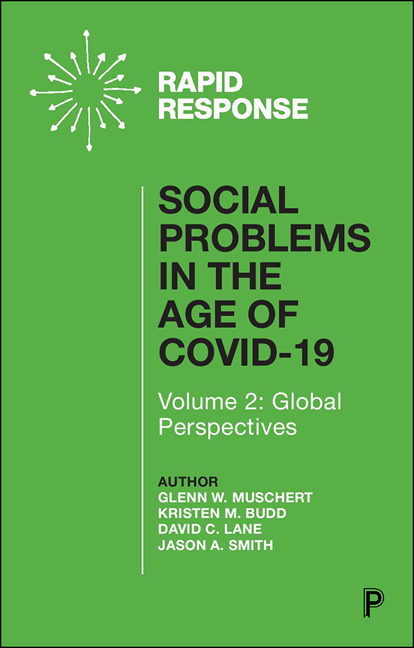Book contents
- Frontmatter
- Contents
- Acknowledgments
- Presidential Welcome
- Editorial Introduction
- 1 Isolation, Economic Desperation, and Exploitation: Human Trafficking and the COVID-19 Crisis
- 2 Uncertainty and Disruption in the Transition to Adulthood During COVID-19
- 3 Disability Rights and Healthcare Rationing during COVID-19
- 4 Social-Distancing the Settler-State: Indigenous Peoples in the Age of COVID-19
- 5 The Pandemic and the Invisible Poor of the Global South: Slum Dwellers in Mumbai, India and Dhaka, Bangladesh
- 6 The Human Right to Water and Sanitation in the Age of COVID-19
- 7 Pandemic Perils of Migrant Workers: Inequalities Intensified
- 8 Food Insecurity and COVID-19
- 9 Protecting Refugee Health and Human Rights in the Context of the COVID-19 Pandemic: Challenges and Pathways to Justice
- 10 COVID-19 Requires an Intersectional Feminist Policy Response
- End Matter
- Afterword
- Index
Presidential Welcome
Published online by Cambridge University Press: 23 March 2021
- Frontmatter
- Contents
- Acknowledgments
- Presidential Welcome
- Editorial Introduction
- 1 Isolation, Economic Desperation, and Exploitation: Human Trafficking and the COVID-19 Crisis
- 2 Uncertainty and Disruption in the Transition to Adulthood During COVID-19
- 3 Disability Rights and Healthcare Rationing during COVID-19
- 4 Social-Distancing the Settler-State: Indigenous Peoples in the Age of COVID-19
- 5 The Pandemic and the Invisible Poor of the Global South: Slum Dwellers in Mumbai, India and Dhaka, Bangladesh
- 6 The Human Right to Water and Sanitation in the Age of COVID-19
- 7 Pandemic Perils of Migrant Workers: Inequalities Intensified
- 8 Food Insecurity and COVID-19
- 9 Protecting Refugee Health and Human Rights in the Context of the COVID-19 Pandemic: Challenges and Pathways to Justice
- 10 COVID-19 Requires an Intersectional Feminist Policy Response
- End Matter
- Afterword
- Index
Summary
The Society for the Study of Social Problems (SSSP) was founded by social scientists who wanted to use their research, scholarship, and teaching to make the world a better place (Galliher and Galliher, 2001; Kolb, 1954). Debating the best strategies and practices for achieving this goal have remained a significant part of the organization's history.
SSSP President David Smith (2017) challenged us to “globalize” our study of social problems. He accurately argued that, as American sociology evolved as a discipline to focus on “society” as a concept, it did so within an increasingly narrow scope and specious project. The United States and Western Europe became the prototype of “society” while other groupings were examined as deviant subcultures and/or underdeveloped nations. From the Chicago School (Abbott, 2017; Low and Bowden, 2013) through the structuralfunctionalism of Parson's Cold War nationalism (Gilman, 2003; Latham, 2011) to theories that suggested a global political and ideological consensus around Bell's (1960) End of Ideology and Fukuyama's (1992) End of History and the Last Man, all came together to produce a deeply flawed yet dominant core for social science. The seemingly seamless modernist framework nurtured American sociologists and their global cohort to develop an increasingly elite, corporate, professionalized, patriarchal, and Eurocentric enterprise under the guise of objective inquiry and scientific analysis.
The rise of anti-colonial and anti-imperialist movements in the second half of the 20th century birthed a more radical sociology that questioned the limitations of “society” as a concept and the triumphalism of western intellectual hegemony in general. Smith suggests, borrowing from previous SSSP President Evelyn Nakano Glenn (2000), that only a movement for “international citizenship” might offer a way to transform the exclusionary rhetoric and politics of the old liberal, modernist tradition with a more international, yet still liberal, narrative of global citizenship and human rights. For sociologists to support such reform movements and fulfill the SSSP mission, Smith and Glenn both concluded that we needed to be more global.
Smith and Glenn are right about sociology. But their analysis still begins with the Chicago School's Eurocentric, nativist model—a modernist intellectual framework for an elite white discipline.
- Type
- Chapter
- Information
- Social Problems in the Age of COVID-19 Vol 2Volume 2: Global Perspectives, pp. vii - xiiPublisher: Bristol University PressPrint publication year: 2020



